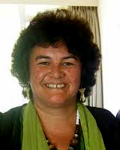Kataraina Pipi, Ngāti Porou, Ngāti Hine, has been working in the field of research and evaluation for more than fifteen years. She is currently based in Auckland running independent company (FEM 2006 Ltd) which specialises in providing facilitation, evaluative, research and promoting Māori music services. She is well known for her use of the PATH tool (Planning Alternative Tomorrows with Hope) in working with community and whānau groups.
I was lucky enough to be able to talk with Kataraina recently about her evaluation work and involvement with Whānau Ora.
How did you come to get into the evaluation field?
I fell into it. I was down the East Coast at the time and I was asked to do an evaluation. I knew the community, the evaluation seemed small and manageable, and there was a lot of support in place so I decided to do it. From there other opportunities came up so I took them on.
Over time it has been based on an interest in exploring the why and how of why things work. I think probably also the work that I did with Fiona on the Iwi and Maori Provider research project back in 2000 was probably a catalyst for doing further evaluation work.
At the moment I know you’re mainly working with the PATH tool…
I am doing a lot of PATH facilitation, PATH planning, whānau facilitation and training facilitators in this area. I also have my commitments to the two whanau ora collectives that I’m working alongside as an action researcher.
I’m also involved in a number of evaluation teams too.
What Whanau Ora collectives are you working with?
I’m currently working alongside Vivienne Kennedy as an Action Researcher for Kotahitanga Whānau Ora Provider Collective, and alongside Maria Baker with Te Hau Āwhiowhio o Otangarei Collective in Whangarei.
What are some of the key things that you have learned or things you’d like to share about undertaking Whānau Ora research?
Undertaking Whānau Ora research has meant developing a thorough understanding of the kaupapa of whānau ora and the whānau ora landscape from a policy level through to provider, services and whānau levels of operation.
[What I have learned through undertaking Whanau ora research] has been about the value of relationships in a research context. We have enjoyed wonderful working relationships, walking alongside the collective as a critical friend, reflecting learnings, asking questions and making observations. We have been invited to key meetings and have made contributions where necessary and asked to do so. This has been a mutually respectful relationship we have constant due regard for their focus and they for ours.
A highlight has been learning from whānau about their journey and how willing they are to share their stories, particularly if they know that other whānau might learn from their experiences
What general advice do you have for researchers working in the whānau ora sector?
As Māori, I think we need to get better at using Māori forms of wānanga in order to get our people talking in more depth about kaupapa. I am really keen for these wānanga to facilitate more reflective discussions about the theory, the philosophies and the principles that underpin kaupapa Māori approaches and how these are put into practice. Then we can focus our learning on the difference that these approaches make for whānau in achieving their aspirations.

